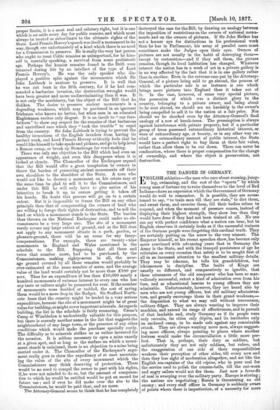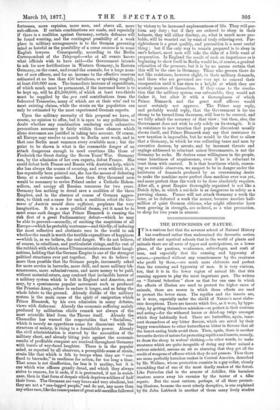THE DANGER IN GERMANY.
ENGLISH athletics—the men who care about running, jump- ing, swimming, and the rest of the " sports " by which young men of fortune try to raise themselves to the level of Red Indians—have an expression which the Government of Germany would do well to remember. It is possible, they are accus- tomed to say, "to train men till they are stale," to diet them, and sweat them, and exercise them, till their bodies refuse to respond, and when the moment of pressure comes, instead of displaying their highest strength, they show less than they would have done if they had not been trained at all. No one can say with perfect confidence what a nation can bear, but to English observers it certainly looks as if the successful trainers of the German people were forgetting this cardinal truth. They are certainly putting on the screw to the very utmost. The Emperor himself, as his recent speeches show, has become only more convinced with advancing years that in Germany the Army is the State, and with the tranquil persistence of age he reiterates on every occasion that safety is to be sought first of all in an incessant attention to the smallest military details. They may b irksome, he tells his grandchildren, but irksomeness is discipline. The faults of Kings are usually so different, and comparatively so ignoble, that these utterances of the old conqueror who has been so mar- vellously successful, extort a kind of admiration even from his foes, and as educational lessons to young officers they are admirable. Unfortunately, however, they are heard also by men who are not young officers, but old military administra- tors, and greatly encourage them in their grand weakness, the disposition to what we may call without irreverence, military fidget. They are always wanting to improve their machine, and extend its range of effectiveness, and in pursuit of that laudable end, study Germany as if its people were only recruits, its cities only depats, and its territories only an enclosed camp, to be made safe against any conceivable attack. They are always wanting more men, always suggest- ing more officers, always pointing to places where another fortress would make the circumvallation a little more per- fect. That is, perhaps, their duty as soldiers, but unfortunately they are not only soldiers, but rulers, and the exaggeration of one side of their responsibilities weakens their perception of other sides, till every now and then they lose sight of moderation altogether, and act like the English sea-captains of the old rdgime, who in pure zeal for the service used to polish the cannon-balls, till the out-worn and angry sailors would not fire them. Just now a fever-fit of zeal is sweeping over the military party. Europe is stirring ; the nations are negotiating ; Russia is threatening an old enemy ; and every staff officer in Germany is suddenly aware of points where there is imperfection, of a necessity for more fortresses, more captains, more men, and above all, more sub-officers. If certain combinations are made, and especially if there is a coalition against Germany, certain defences will be found wanting, and the contingent possibility of a weak place in military arrangements is to the German governing mind as hateful as the possibility of a casus omissus is to some English lawyers. Consequently, according to the Berlin•Correspondent of the Telegraph—who at all events knows what officials wish to have said—the Government intends to ask for new fortifications in Western Germany, in Eastern Germany, on the coast, and round the arsenals, for a large num- ber of new officers, and for an increase to the effective reserves estimated at no less than 450 battalions, or speaking roughly, at least 450,000 men. The immediate increase of expenditure, of which much must be permanent, if the increased force is to be kept up, will be £6,500,000, of which at least two-thirds must be supplied by the pro ratd contributions from the federated Treasuries, many of which are at their wits' end to meet existing claims, while the strain on the population can only be estimated by the most experienced German experts.
Upon the military necessity of this proposal we have, of course, no opinion to offer, but it is open to any politician to doubt whether any combination rendering such exhaustive precautions necessary is fairly within those chances which alone statesmen are justified in taking into account. Of course, all Europe may resolve to march to Berlin next week, and in that case Berlin must summon every available man ; but the point to be shown is what is the reasonable danger of an attack dangerous enough to need exertions like those of Frederick the Great during the Seven Years' War. Germany can, by the admission of her own experts, defeat France. She could defeat both France and Russia with Austrian help, which she has always the means of securing, and even without it, as has repeatedly been pointed out, she has the means of defeating them at a certain sacrifice. Less than fifty thousand men would be necessary to revive Poland under a Catholic Hohen- zollern, and occupy all Russian resources for two years. Germany has nothing to dread save a coalition of the three Empires, and in the absence of course of German aggres- sion, to think out a cause for such a coalition which the Ger- mans of Austria would deem sufficient, perplexes the very imagination. It is a mere political dream, yet it must be to meet some such danger. that Prince Bismarck is running the risk first of a great Parliamentary defeat—which he may be able to prevent—secondly, of exciting the suspicions of all Europe—which he probably contemns—and thirdly, of inducing the most reflective and obstinate race in the world to ask whether the result is worth the terrible expenditure of happiness —which is, as we believe, the real danger. We do not believe, of course, in rebellions, and particularist risings, and the rest of the rubbish with which some Ultramontanists amuse their imagi- nations, holding that the German Empire is one of the strongest political structures ever put together. But we do believe it more than possible that the German people, incessantly asked for more service in barracks, more drill, and more military irk- somenesses, more submissiveness, and more money to be paid, without material return, may contract that invincible horror of a military system which is felt in England and America, and may, by a spontaneous popular movement such as produced the Prussian Army, refuse to endure it longer, and so bring the whole fabric to the ground. Already dislike of the military system is the main cause of the spirit of emigration which Prince Bismarck, by his own admission in many debates, views with disfavour. Already the economic suffering mainly produced by militarism elicits remark not always of the most scientific kind from the Throne itself. Already the Chancellor has warned the respectables that "Socialism," which is merely an opprobious name for discontent with the structure of society, is rising to a formidable power. Already the civil administration is starved by the necessities of the military chest, and already biting jests against the economic results of profitable conquest are received throughout Germany with bursts of wry-faced laughter. There is in the popular raind, as reported by all observers, a perceptible sense of strain, strain like that which is felt by troops when they are "con- ned to barracks," in readiness for action, for too long a time. That sense is not disaffection, far less is it mutiny, but it is one which wise officers greatly dread, and which they always strive to remove, for it ends, if it is protracted, if not in resist- ance, then in that form of despair which deprives soldiers of half their force. The Germans are very brave and very obedient, but they are not a " one-legged people," and do not, any more than any other race, like the consequence of great self-sacrifice followed by victory to be increased unpleasantness of life. They will per- form any duty ; but if they are ordered to sleep in their helmets, they will either disobey, or, what is much more pro- bable, will be wearied out by want of truly relieving rest. Far- sightedness is a great quality, and precaution is a most useful thing ; but if the only way to remain prepared is to sleep in one's helmet, most men will take the risks of a little want of preparation. In England the result of such an impatience as is beginning to show itself in Berlin would be, of course, a gradual relaxation of the pressure, but it is by no means certain that this will be the case in Germany. Those who govern there do not like resistance, however slight, to their military demands, and those who are governed are very apt to conceal their. exasperation until it has risen to a height at which they are scarcely masters of themselves. If they came to the resolu- tion that the military system was unbearable, they would not tinker it, but alter it with a thoroughness of which Prince Bismarck and the great staff officers would most certainly not approve. The Prince may reply, and probably would reply, that the Government is far too strong to be turned from its course, still less to be coerced, and we fully admit the accuracy of that view ; but then, also, the Government does not wish to rely solely on its strength. It is in resistance to new taxation that popular discontent usually shows itself, and Prince Bismarck may say that resistance to new taxation is impossible, but he would be the first to allow that a Germany, in which he was collecting taxes and men by executive decrees, by arrests, and by incessant threats and urgings addressed to reluctant minor Governments, is not the Germany he seeks. He desires some willingness in the people, some heartiness of acquiescence, even if he is reluctant to trust them with control. It is that heartiness which, reason- ing as outside observers, we suspect to be in danger under the hailstorm of demands produced by an overweening desire to make the machine more perfect than machine ever was yet, and more perfect than the work to be done absolutely requires. After all, a great Empire thoroughly organised is not like a Dutch dyke, in which a rat-hole is as dangerous to safety as a yawning chasm. France will not attack Germany a week the later, or be defeated a week the sooner, because another half- million of quiet German citizens, who might otherwise have been growing in strength, are ordered, as a wise precaution, to sleep for two years hi armour.



































 Previous page
Previous page